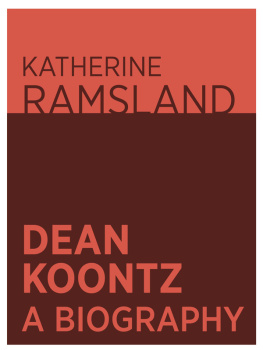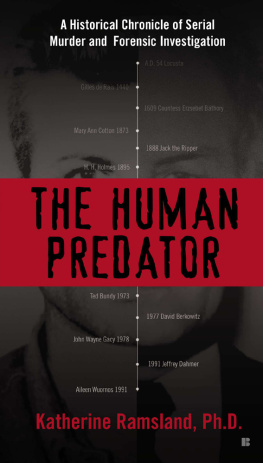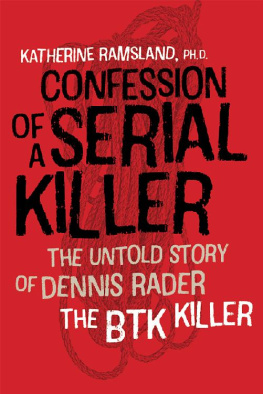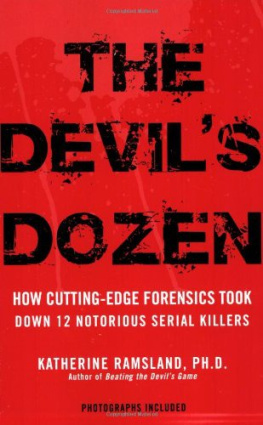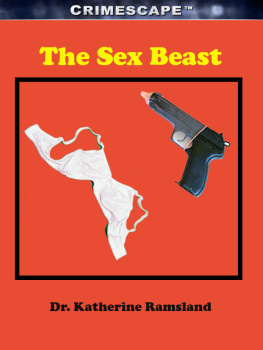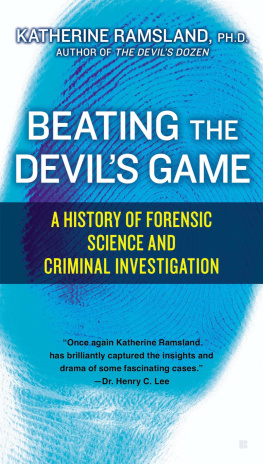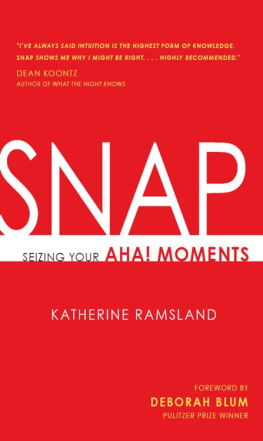Ramsland Katherine M - A Writers Biograpraphy
Here you can read online Ramsland Katherine M - A Writers Biograpraphy full text of the book (entire story) in english for free. Download pdf and epub, get meaning, cover and reviews about this ebook. publisher: Headline Book Publishing, genre: Detective and thriller. Description of the work, (preface) as well as reviews are available. Best literature library LitArk.com created for fans of good reading and offers a wide selection of genres:
Romance novel
Science fiction
Adventure
Detective
Science
History
Home and family
Prose
Art
Politics
Computer
Non-fiction
Religion
Business
Children
Humor
Choose a favorite category and find really read worthwhile books. Enjoy immersion in the world of imagination, feel the emotions of the characters or learn something new for yourself, make an fascinating discovery.
- Book:A Writers Biograpraphy
- Author:
- Publisher:Headline Book Publishing
- Genre:
- Rating:5 / 5
- Favourites:Add to favourites
- Your mark:
- 100
- 1
- 2
- 3
- 4
- 5
A Writers Biograpraphy: summary, description and annotation
We offer to read an annotation, description, summary or preface (depends on what the author of the book "A Writers Biograpraphy" wrote himself). If you haven't found the necessary information about the book — write in the comments, we will try to find it.
A Writers Biograpraphy — read online for free the complete book (whole text) full work
Below is the text of the book, divided by pages. System saving the place of the last page read, allows you to conveniently read the book "A Writers Biograpraphy" online for free, without having to search again every time where you left off. Put a bookmark, and you can go to the page where you finished reading at any time.
Font size:
Interval:
Bookmark:
DEAN KOONTZ
A WRITERS
BIOGRAPHY
Katherine Ramsland
Dean Koontz: A Writers Biography
All Rights Reserved 1997 by Katherine Ramsland
No part of this book may be reproduced or transmitted in any form or by any means, graphic, electronic, or mechanical, including photocopying, recording, taping, or by any information storage or retrieval system, without the written permission of the publisher.
Published by Katherine Ramsland
Originally published by HarperPrism
In memory of my dearest friend, Corey,
who wanted me to write this book, but who died two
hours before I could tell him that I was going to
and
and for Jim Kerr,
who inadvertently launched my writing career.
A FEW YEARS AGO, WHEN I HAD FINISHED WRITING A BIOGRAPHY of Anne Rice, I pondered other possibilities. The first name that came to mind was Dean Koontz. I knew that hed had a rough childhood with an alcoholic father, and Id read some of his dark suspense. I thought he might have an interesting story. Yet I hesitated to contact him, because friends had told me he was quite private and very busy.
So I went on to write other books. Then one day in April 1994, I saw Dean at a breakfast that Ballantine Books was giving for authors at the American Booksellers Association convention. I thought, why not? I introduced myself. He knew my work with Rice, so I asked rather bluntly, How about a biography of you?
Thats not the proper way to do it, of course. I should have done some research first, should have been prepared, but he was standing right there. So I jumped in.
To my surprise, he was open to the idea if I thought I could get an editor interested in such a project. Well, there were thousands of editors at that conference, many within a few feet of us. I knew that wouldnt be any problem. I returned within five minutes with an assurance that there was interest, and that began the intense association that resulted in this book.
Before I had even written a proposal, Dean sent me copies of all of his books. This was the first of his generous gestures, which were to continue throughout the course of this project and one of many that I was to hear about along the way. I also learned a lot about the business of writing, and Dean and his friends all have such a great sense of fun that I thoroughly enjoyed every interview.
I was especially pleased with how willing Dean was to explore his childhood terrain. Our interviews could go on for hours, whether over the phone or face-to-face. No matter how personal the questions, he never told me to go mind my own business. (Well, this is my business, but even so, I didnt really expect him to answer every question.)
In the end, I had so much material that I could not possibly use it all, so I had to pick and choose according to a central theme that had gradually formed as I became familiar with his work: toxic intimacy between people closely related to each other and the dread of contamination, resisted through loving human bonds. I saw this in nearly every book, and it became quite clear that Dean had put his personal fears into motion in many different ways, formed from a childhood spent with an unpredictable, sociopathic father.
Now, before anyone accuses me of doing a Freudian analysis on an anti-Freudian writer, let me explain my basic approach. There are people who see the word subconscious or hear childhood issues and automatically think, thats Freud. But that reaction is an oversimplification. A great many psychological theories utilize these notions, but in ways quite different from what Freud proposed. In fact, my approach mixes Jungs theories and existentialism with recent work in psychoneurology. With all of that, I write psychobiography with a philosophical twist. In other words, I think the subconscious has a strong bodily component, but I leave room for a bit of conceptual finesse. I do believe that, despite the strong influence on us of many factors, we have a certain amount of free will, which means that we have some responsibility in what we become. The following account, in the most simple terms, is the way I understand it.
First, the technical part:
All systems that make up who we are emotional, physical, mental are organized around information. Each part processes information in its own way, and any given piece of information can be transformed through neural messengers from one system into another. Emotional stress, for example, can translate into the body as illness, and physical illness can adversely affect ones moods. Thats common knowledge, but there is a much stronger relationship between mind and body than many people realize. According to research, emotional patterns from long-term exposure to various situations are absorbed by the body, and these become encoded at a cellular level. They are stored as body memories. What we learn and the strength of any given memory is contingent on our psychophysiological state at the time. Certain things can heighten emotional response, and those memories get more readily stored, often remaining imprinted for years. If we are in a state of fear, for example, hormones are released that influence our memory of that situation, and we will recall the experience more vividly than, say, something we had for breakfast two weeks ago.
In addition to emotional encoding, another factor comes into play. Our systems tend toward homeostasis toward keeping our inner world constant. When an emotional scenario becomes physically imprinted, we tend to bring into our lives whatever will recreate that scenario, even if we find it painful. Someone who grows up attuned to the low energy level of a quiet family may have difficulty adjusting to the chaos of a spouses boisterous family. Or a person with many siblings may have trouble living alone later in life. Each knows within his body the energy level that has become part of his personal rhythms, and body memories seek to retain the status quo.
This is not to fall back on yet another form of cause-and-effect psychology. There is no one-to-one correlation between a set of circumstances and future behavior. Children from the same family may develop quite different ways of processing and storing this information, and some may be more aware than others of how to resist certain patterns. Yet it becomes clear from the patterns displayed in any persons life just what his or her form of encoding might be. I have seen a woman who did not have osteoporosis nevertheless develop the stooped posture of her mother, who did. I have seen a man who grew up in a family that suppressed emotion have difficulty caring for his wife or children. Modeling and the household arena have a strong impact on our emotio-physical identities. Yet those patterns can be brought to awareness, and changed.
Thus, there is nothing inherently Freudian when discussing subconscious factors. I believe that the subconscious can have a profound influence on who we are and what we do, but I also believe that no one is trapped by that. We can transcend such influences and initiate change that will make us into people quite different from what might be predicted from childhood factors. I think Dean Koontz exhibits this transformation. The repeated patterns in his novels of his understanding of evil show great consistency, but the way he has chosen to live in awareness of what his father was, with the determination to be something different, presents a person for whom psychological fate may have diminished force. This book therefore is a eurography rather than a pathography, in that it maps the life of a person who has become psychologically healthy.
The term psychobiography means that I read through the novels and stories looking for things that confirmed or illuminated aspects of Deans life. Often I learned things about him from the books that deepened my understanding of life experiences about which he had already told me; sometimes the books inspired me to ask questions I had not thought of during our interviews. Since there is an organic relationship between life and art, a writers experience and his work will each inform the other. There is a theory that the serious works of an author are always about the same theme, and that seems to hold true. Writers keep trying over and over to make sense of the world through whatever most concerns them. Since the kinds of life experiences that might preoccupy a writer are usually complicated and unfinished, it makes sense to look for repeated psychological patterns in the work.
Font size:
Interval:
Bookmark:
Similar books «A Writers Biograpraphy»
Look at similar books to A Writers Biograpraphy. We have selected literature similar in name and meaning in the hope of providing readers with more options to find new, interesting, not yet read works.
Discussion, reviews of the book A Writers Biograpraphy and just readers' own opinions. Leave your comments, write what you think about the work, its meaning or the main characters. Specify what exactly you liked and what you didn't like, and why you think so.

